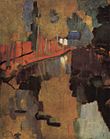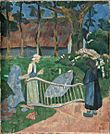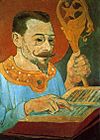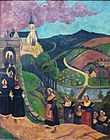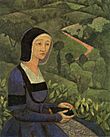Paul Sérusier facts for kids
Quick facts for kids
Paul Sérusier
|
|
|---|---|
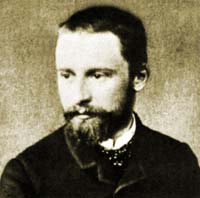 |
|
| Born | 9 November 1864 Paris, France
|
| Died | 7 October 1927 (aged 62) Morlaix, France
|
| Alma mater | Académie Julian |
| Known for | Painting |
| Movement | Post-Impressionism |
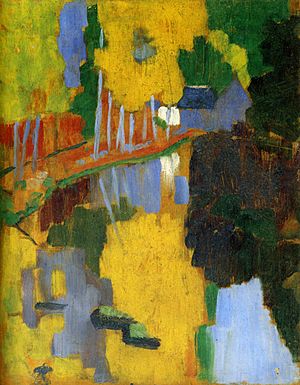
Paul Sérusier (born November 9, 1864 – died October 7, 1927) was a French painter. He was important in starting a new way of painting called abstract art. His ideas also inspired a group of artists known as the Nabis. He helped create art styles like Synthetism and Cloisonnism.
Early Life and Art School
Paul Sérusier was born in Paris, France. He went to art school at the Académie Julian. He even worked there as a helper in the mid-1880s.
In the summer of 1888, he traveled to a place called Pont-Aven. This was a village where many artists gathered. There, he joined a small group of painters led by Paul Gauguin.
While at the Pont-Aven artist's colony, Sérusier painted a famous picture. It became known as The Talisman. Gauguin helped him a lot with this painting. This artwork was a strong example of Cloisonnism. It looked almost like pure abstract art.
Sérusier was a Post-Impressionist painter. He was part of a group called Les Nabis. Paul Sérusier and Paul Gauguin actually named this group. Other famous artists like Pierre Bonnard, Édouard Vuillard, and Maurice Denis were also part of the Nabis.
Later Life and Teaching
In 1892, Sérusier met a Scottish artist named Charles Hodge Mackie. They became good friends. This friendship led Sérusier to draw an illustration called Pastorale Bretonne. It was for a book published in Edinburgh in 1895.
Later in his life, Paul Sérusier taught art at the Académie Ranson. He also wrote a book about painting. It was called ABC de la peinture and came out in 1921. He passed away in Morlaix, a town in Brittany, France.
Gallery of Paintings
See also
 In Spanish: Paul Sérusier para niños
In Spanish: Paul Sérusier para niños
 | Calvin Brent |
 | Walter T. Bailey |
 | Martha Cassell Thompson |
 | Alberta Jeannette Cassell |


